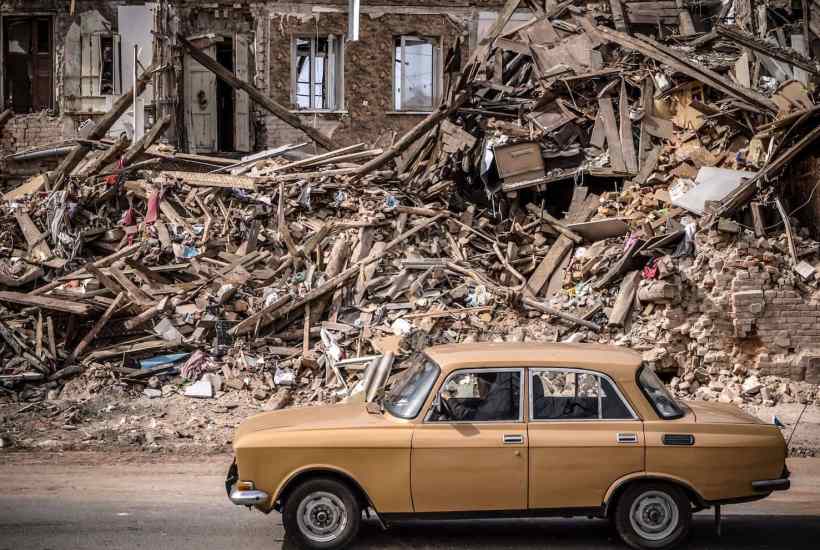‘Our home is our heart,’ a video posted by a couple from the Kyiv suburb of Hostomel begins, showing them cycling through its leafy streets and playing with their dogs. In a split second, the picture changes. Their house is on fire. Outside, a car has ploughed into a ditch, its young passengers shot dead. Helicopters tear overhead while Russian soldiers stalk the surrounding woodland.
The UN estimates that 3,500 innocent people have been killed or injured since the invasion of Ukraine began. As Russian troops are pushed back around the capital, evidence is mounting that the number may already be much higher.
Just south of Hostomel is the suburb of Bucha, which the Ukrainian army retook last week from Moscow’s forces. The roads there are lined with corpses, many with their hands bound and with gunshot wounds to the heads. Bodies of residents have been found half-submerged in pits, heaped up behind buildings. According to a local coroner, hundreds have died, at least 50 as part of extrajudicial killings, with Russian soldiers allegedly executing military-age males as they pulled out. The Ukrainian Defence Ministry says Bucha now has a place in history as a ‘new Srebrenica’.
There is a grim familiarity in this pattern. Two years ago, a UN report accused Russian forces of war crimes in Syria, indiscriminately dropping cluster bombs over civilian areas with total disregard for civilian life and without any clear military objectives. Other attacks on farms and water pumping stations were said to have been designed to force desperate people to flee their homes.
Now, in Mariupol, the Russian airforce has been accused of bombing a theatre where thousands of people were taking shelter, despite the word ‘children’, spelt out on the ground, being visible from the air. The general alleged to have ordered that attack, Mikhail Mizintsev, also planned the strikes on Syrian cities that killed around 18,000 people. He has become the face of what Kyiv says is a deliberate strategy: targeting innocent people in an attempt to pound Ukraine into submission.
As in Syria, Moscow denies all involvement in these atrocities. The Kremlin insists that it only attacks military targets, while also claiming photos and videos are false flags designed by their enemies. When videos surfaced purporting to show Ukrainian servicemen shooting surrendering Russian troops in the legs, Kyiv ordered an immediate inquiry. Moscow, meanwhile, ignores, rejects and deflects. The growing cases of reported rapes, murders and lootings cannot be blamed solely on poorly-trained soldiers. The sheer numbers stand as proof that the Kremlin is not just tolerating war crimes but endorsing them.
As in the Middle East, Russia is betting that America and its allies will not intervene. For now, it seems a safe bet: what more could the West do?
When asked about a no-fly zone, White House press secretary Jen Psaki said that such a policy would ‘essentially mean us shooting down Russian planes’. Likewise, Washington vetoed a Polish plan to hand over 28 MiG fighter jets. Under the proposal, Poland would have received new American-made F-16 warplanes to fill the gaps in its defence force. However, the deal fell through amid fears it could escalate the risk of outright confrontation between Russia and the US.
Instead, Nato nations continue to point to large shipments of anti-air and anti-tank rockets as evidence that they are helping. The crucial point, though, is that these weapons are defensive. What’s more, many of these deliveries began long before the war started. Western powers are understandably wary of introducing new offensive weapons into a warzone.
Similarly, the sheer scale of sanctions imposed on Russia is almost unprecedented in modern history, damaging the rouble and isolating industries like aerospace and banking from world markets. Now though, as pressure grows to act over what appear to be Russian war crimes, lawmakers will be asked to go further. But how much further can they go? Germany, for example, is resisting demands to ban Russian gas imports, fearing a recession. And what happens if Russia, losing militarily, faces internal collapse from extreme sanctions? A desperate, nuclear-armed Putin does not sound like a good outcome.
So the West is in a bind. Go further economically and risk potentially catastrophic Russian destabilisation. Go further militarily and risk a third world war. And yet if the West fails to act, more Buchas, Mariupols and Hostomels will be the result.
Got something to add? Join the discussion and comment below.
Get 10 issues for just $10
Subscribe to The Spectator Australia today for the next 10 magazine issues, plus full online access, for just $10.



















Comments
Don't miss out
Join the conversation with other Spectator Australia readers. Subscribe to leave a comment.
SUBSCRIBEAlready a subscriber? Log in